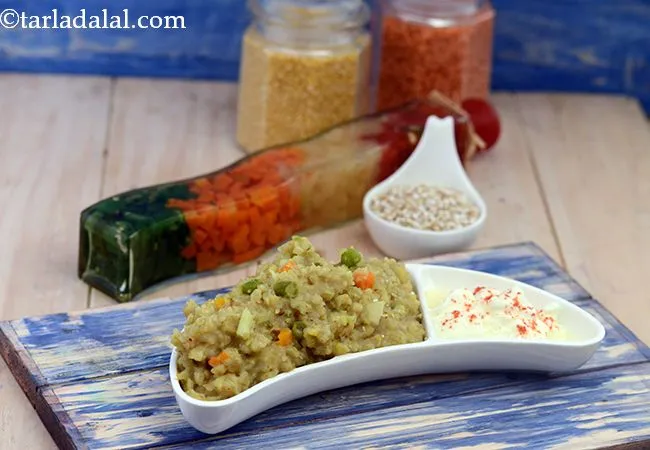Calories in Vegetable Biryani Recipe (Desi Biryani)
This calorie page has been viewed 131785 times

Table of Content
How many calories does one serving of Vegetable Biryani have?
One serving of Vegetable Biryani gives 241 calories. Out of which carbohydrates comprise 56 calories, proteins account for 19 calories and remaining calories come from fat which is 161 calories. One serving of Vegetable Biryani provides about 12 percent of the total daily calorie requirement of a standard adult diet of 2,000 calories.
Click on to view Vegetable Biryani recipe. Vegetable Biryani is a traditional Mughlai Biryani made with rice, lots of mixed vegetables, onions, curds and tomatoes.
Is Vegetable Biryani healthy?
Yes and No, depends who is eating it. Made from rice, mixed vegetables, onions, tomatoes, curd, paneer oil and Indian spices.
Let's understand the Ingredients.
What's good.
Mixed Vegetables : You get the benefits of lots of nutrients as you are using cauliflower, carrots, cabbage, french beans and green peas. Cauliflower is extremely low in carbs and therefore does not raise blood glucose levels. Rich in Antioxidant and read here for detailed benefits of cauliflower. Cabbage is low in cal, relieves constipation, good for diabetics and see here all benefits of cabbage. Green peas are good for weight loss, good source of vegetarian protein, has insoluble fibre to relieve constipation. Is green peas good for diabetics and see full benefits of green peas.
Tomatoes : Tomatoes are extremely rich source of Lycopene. Tomatoes are a powerful antioxidant, super rich in Vitamin C, good for heart. Tomatoes are a Pregnant women's friend and are rich in Folate or Folic Acid which helps your body to produce and maintain new cells, especially red blood cells. Read about 13 amazing benefits of tomatoes.
Onions : Yes, its a great antioxidant. The phytochemical present in onions along with their Vitamin C help boost your immunity. The chromium in onions help regulate your blood pressure. The sulphur in the onion which brings you tears is actually good for your eyes. Raw onions keep your heart healthy and see here for total benefits of onions.
What's the problem?
Rice : Here are the pros for rice. Rice is a great source of complex carbohydrates, which is an important source of energy for our body. Rice is low in fibre and therefore a good option for people suffering from diarrhoea. What's not good in rice. Foods like rice are high in Glycemic index are not suitable for weight loss, heart patients, diabetics as they affect the blood sugar control levels. See details of is white rice and parboiled rice good for you?
Can diabetics, heart patients and over weight individuals have Vegetable Biryani?
No, there is too much rice used in this recipe. For all, there is too many carbs.
What is a healthier option than using vegetable biryani made from rice?
We suggest the following healthy khichdi like fada ni khichdi recipe, vitamin khichdi recipe, buckwheat moong dal and vegetable khichdi, bajra moong and green peas khichdi, barley khichdi and vegetable biryani from brown rice. All these recipes have ZERO usage of rice and portion control is suggested for diabetics.
Buckwheat, Moong and Vegetable Khichdi
Can healthy individuals have Vegetable Biryani
The issue here is usage of rice which is got tons of carb. Luckily this recipe has used lot of mixed vegetables low in carbs, curds, onions and tomatoes. So eat a bit of this. This recipe works well if you want to put on weight.
Vegetable Biryani is high in
1. Calcium : Calcium is a mineral that makes bones stay strong. Required from kids to adults.
2. Vitamin C : Vitamin C is a great defence against coughs and colds.
Note : a recipe is deemed high in a Vitamin or mineral if it meets 20% and above the recommended daily allowance based on a 2,000 calorie diet.
How to burn 241 calories that come from one serving of Vegetable Biryani?
Walking (6 kmph) = 1 hr 12 mins
Running (11 kmph) = 24 mins
Cycling (30 kmph) = 32 mins
Swimming (2 kmph) = 41 mins
Note: These values are approximate and calorie burning differs in each individual.
| Value serving | % Daily Values | |
| Energy | 448 kcal | 22% |
| Protein | 8.9 g | 15% |
| Carbohydrates | 60.8 g | 22% |
| Fiber | 5.73 g | 19% |
| Fat | 18.21 g | 30% |
| Cholesterol | 4.0 mg | 1% |
| VITAMINS | ||
| Vitamin A | 679.0 mcg | 68% |
| Vitamin B1 (Thiamine) | 0.1 mg | 9% |
| Vitamin B2 (Riboflavin) | 0.1 mg | 7% |
| Vitamin B3 (Niacin) | 1.7 mg | 12% |
| Vitamin C | 25.9 mg | 32% |
| Vitamin E | 0.2 mg | 3% |
| Folic Acid (Vitamin B9) | 27.8 mcg | 9% |
| MINERALS | ||
| Calcium | 155.3 mg | 16% |
| Iron | 1.4 mg | 8% |
| Magnesium | 83.4 mg | 19% |
| Phosphorus | 268.8 mg | 27% |
| Sodium | 26.3 mg | 1% |
| Potassium | 238.2 mg | 7% |
| Zinc | 1.1 mg | 6% |
Percent Daily Values are based on a 2000 calorie diet. Your daily values may be higher or lower depending on your calorie needs.

Click here to view Vegetable Biryani ( Desi Khana)
Calories in other related recipes













